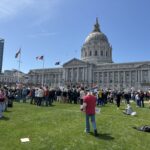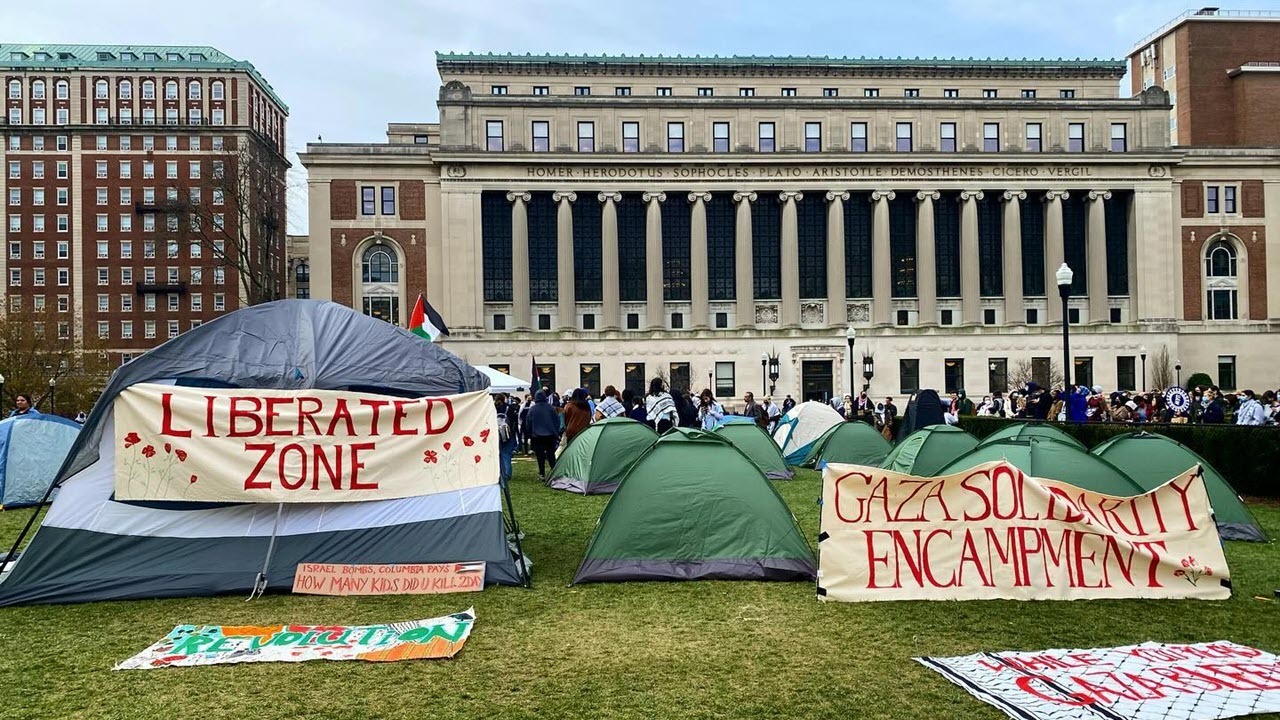Co-written by Ruby Kilar ’26 and Mayen Thorsen ’25
Protests on college campuses have erupted throughout the country as the war in Gaza continues to be catastrophic, with over 30,000 lives lost in just seven months. Since the attacks on October 7, students have protested at universities throughout the U.S. in response to the war. Most recently, these demonstrations have evolved into weeks-long pro-Palestine encampments on over 80 college campuses, with thousands of protesters nationwide. Over the past few weeks, these college encampments have received national news coverage as over 2,000 participants have been arrested in addition to the many who are facing disciplinary action.
While most students and faculty are protesting in the name of a ceasefire, many of the encampments are also demanding disclosure and divestment of university finances associated with Israel. A recent study published by The National Association of College and University Business Officers (NACUBO) tallied that roughly 700 U.S. universities hold endowments that amass to a total of $840 billion. Students are calling for transparency regarding endowment investments in Israel and industries that support the war — ultimately calling for the reallocation of these funds.
“Putting an end to hate and pursuing divestment have been at the heart of these movements” said a student at Columbia. However, according to CBS News, “some Jewish students say the protests have veered into antisemitism and made them afraid to set foot on campus.”
We interviewed college students — including some LWHS alumni — who attend Columbia University, University of Pennsylvania (Penn), Stanford University, University of California, Los Angeles (UCLA) and Yale University. This is what they had to say about the encampments and activism currently taking place on their campuses. ]
COLUMBIA UNIVERSITY, NEW YORK, NY—
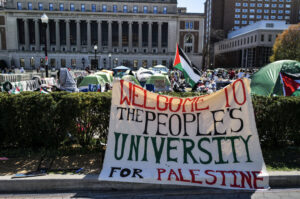
photo courtesy of The Chronicle of Higher Education
“Of course it was loud — it wouldn’t be a protest if everyone was sitting there silently. But the media is far more concerned with the disruptive nature…And that’s kind of been the whole sentiment this entire time…everyone is so worried about the commotion of the protests, but not what’s being protested or why,” said one junior at Columbia.
According to this student, since October 7, both students who identify as being “pro-Israel” and students who align with “pro-Palestine” sentiments have been extremely frustrated by the school’s response during the war, as well as their lack of accountability surrounding incidents of Islamaphobia, antisemitism and police involvement.
On April 17, over 100 students pitched tents on Columbia’s South Lawn. Despite the violent and chaotic media portrayal, many students have found sanctuary inside the encampment. “The encampment itself was very peaceful. When I walked through it, there was no violence that I saw…people were even doing homework. It’s outside Columbia’s gates that there’s a lot of action — extremists on both sides and police in large numbers,” she said.
However, on April 18, Minouche Shafik, Columbia President, suspended over 100 individuals and called law enforcement to remove students from the lawn. “When you suspend students, they’re immediately blocked from accessing housing and meal plans, which is incredibly problematic. A lot of kids depend on those resources on a daily basis, so the suspensions really fueled the fire,” the student said.
As the encampment continued, students felt that their priorities misaligned with that of the administration. On April 29, at least 44 protestors occupied Hamilton Hall (Columbia Spectator). “It was a callback to what kids had done in 1968, during the Vietnam war. They wanted the school to divest from companies who were profiting from the war, similarly to what students are fighting for,” the student said.
Upper level university officials negotiated with students for a resolution; however, the students were solely in support of the entire divestment from Israel. “It’s not a venture capitalist fund, it’s not some sort of investment firm. A schooling institution is supposed to be a school first, and that’s where the fundamental issue lies,” she said.
UNIVERSITY OF PENNSYLVANIA, PHILADELPHIA, PA—
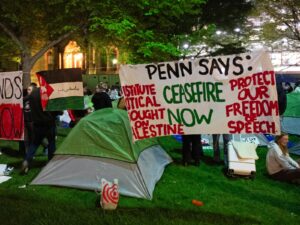
photo courtesy of Axios Philadelphia
“There are probably people that aren’t there for the right reasons, but a vast majority of Penn-affiliated students are there to support the Arab students on campus and make sure Penn is doing everything they can to support the innocent people in Gaza,” said one Penn junior.
On April 25, students and faculty from Penn, Drexel University and Temple University marched from Philadelphia’s Center City to College Green — a central quad on Penn’s campus — where demonstrators eventually set up the “Gaza Solidarity Encampment.”
According to this source, since the encampment’s beginning, students have observed a rise in antisemitic and Islamophobic behavior on campus. On one account, the campus’s widely popular statue of Benjamin Franklin, was vandalized with an antisemitic slur spray painted across it. Penn’s outdoor campus is entirely open to the public, meaning during these acts, school administrators became unsure whether they were being carried out by students or non-Penn affiliated individuals.
There has been discussion among students that police surrounding the encampment would begin performing ID checks on all individuals involved in the encampment to combat these these Islamophobic and antisemitic incidents. “Students agree to certain codes of conduct when they enroll at Penn. So, it makes sense that should Penn students violate any of the universities’ policies [surrounding hate speech and protesting], they should face disciplinary action. But what makes it challenging is that those rules don’t necessarily apply to the non-Penn students involved,” she said.
The encampment has altered how students think about activism and what it means to be involved in a movement. “The goal is not to set up tents and cause chaos. They want Penn to divest their endowment, disclose information about their finances, and defend those who are involved in the war,” she said. “At the end of the day, some people are willing to put more on the line than others to achieve those things…By just being involved with the protests, they’re already at risk of suspension and arrest.”
STANFORD UNIVERSITY, PALO ALTO, CA–
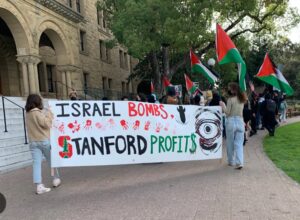
photo courtesy of The Stanford Daily
“It’s incredibly frustrating to have people weaponize antisemitism against an anti-war movement,” said one Stanford freshman.
This student, also a member of Stanford’s Jewish Voice for Peace, disagrees with claims that pro-Palestinian activism on Stanford’s campus is rooted in antisemitism. Instead, she shared her positive experience with student activism, finding community within the encampment. “When we were camping overnight to keep the sit-in, students spontaneously broke out into song and began dancing…it was a level of joy and sense of community that really, I haven’t felt at Stanford since then,” she said.
Critics of the pro-Palestinian movement often take issue with rhetoric perceived as antisemitism. In an article for the Atlantic, Stanford sophomore Theo Baker claims that Jewish students at Stanford “have been given good reason to fear for their safety,” reporting that some Jewish students have been followed or harassed, and criticizing certain slogans used by protestors. These statements have included “We don’t want no two states, we want all of ’48!” and “From the river to the sea.”
Stanford’s first encampment, the “Sit-In to Stop Genocide”, began on October 27, 2023; it later became the longest sit-in protest in Stanford University history, lasting for 115 days. On April 25, during Stanford’s admitted students weekend, students reestablished a second encampment on the university’s White Plaza, to the dismay of the university and some incoming students.
The demands of student demonstrators can be encapsulated in the three letter acronym BDS — boycott, divest, sanction. Students are calling for the university to separate itself from any companies or organizations advancing military efforts of the Israeli government in the war. “Recently we held student elections…[and] there was an initiative on the ballot that showed popular support for BDS… it passed with 70% approval,” the student said.
UCLA, LOS ANGELES, CA–
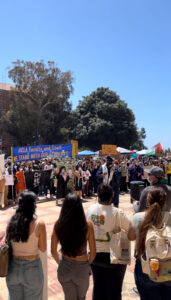
photo by a UCLA student
“The encampment is honestly a really precarious place to be. It’s beautiful and empowering but it’s also a stressful environment because we are under constant attack,” a freshman at UCLA said.
While this student spoke to the difficulties of student activism, she emphasized that the press must refocus coverage to center why students are protesting. “The media is focusing on and sensationalizing these moments of violence, but…they’re not…focusing on why we’re there and what we stand for,” she said.
She believes that the protests are fighting for the freedoms of Palestinians. “We have people from every community, including a large population of Jewish students, who are truly standing for liberation…we all hold the understanding that liberation for Palestine is liberation for everybody,” she said. The source says that the communal aspect of her activism helps her stay motivated. “What’s kept me going is my community. All of my best friends are out here…and [there’s] this sense [that] everybody here really is family,” she said.
The encampment on UCLA’s campus began on April 25, and was initially largely peaceful. UCLA’s protesters demanded increased transparency by UCLA about its investments, divestment and boycotting of institutions connected to Israel, and decreased policing by UCLA.
On April 30, shortly before the encampment was dismantled, at least 100 masked counter protesters stormed the camp. Reports from The Hollywood Reporter and The New York Times say attackers were carrying items indicating pro-Israeli sentiment, and that they blared the Israeli national anthem. These counter protesters physically attacked students,shining lights, spraying irritant gases and launching firecrackers at the encampment. Meanwhile, UCLA campus police took no immediate action to stop the attack on students, leaving them waiting for several hours. 25 students were later hospitalized as a result of the attack.
YALE UNIVERSITY, NEW HAVEN, CT–
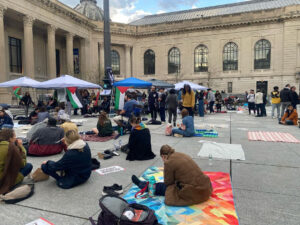
photo by a Yale student
“We understand that our liberation and our freedom as students is very intimately tied to people in Palestine,” said a junior at Yale.
This student visited the West Bank in 2019, a vital experience in her career as a pro-Palestinian activist. “I cultivated a lot of relationships [and] made friends who are there… I still keep in contact with them over social media,” she said.
The source has been involved in pro-Palestinian activism at Yale since her freshman year, participating in and organizing numerous demonstrations. She feels that Yale’s response to the recent protests has been disheartening. “From the beginning [the response] was very antagonistic,” she said.
On April 19, student demonstrators built a “Books Not Bombs” encampment designed to be a public library display. The structure was built during a Yale Board of Trustees dinner, and occupied the school’s Beinecke Plaza. The university claims protesters blocked pedestrian access to the campus, despite reports showing that pedestrians could still walk around to reach the other side of the Plaza and entrance to the Schwarzman Center. The encampment was forcefully dismantled the morning of April 22.
On April 28, a second encampment appeared called the “liberated zone.” According to Yale Police Chief, Anthony Campbell, this encampment similarly violated university policies regarding the use of outdoor spaces. Almost 50 students were later arrested as police took down the encampment on April 30.
The Yale student plans to continue advocating for her beliefs, hoping to see the university meet the demands of student organizers. She attributes her persistence to the people she believes she is fighting for. “I’ll text my friends who are in Palestine and they’ll say: ‘We see what you’re doing, we appreciate it, and we stand with you’… that gives me hope to remember who I’m doing all of this for,” she said

